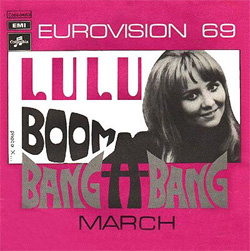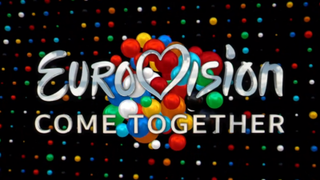The United Kingdom held a televised national pre-selection broadcast on BBC1 to choose the song that would go to the Eurovision Song Contest 1969 with Scottish singer Lulu chosen to represent the UK.
The United Kingdom held a national preselection to choose the song that would go to the Eurovision Song Contest 1976.
The United Kingdom participated in the Eurovision Song Contest 2003 with the song "Cry Baby" written by Martin Isherwood. The song was performed by the duo Jemini. The British entry for the 2003 contest in Riga, Latvia was selected via the national final A Song for Europe 2003, organised by the British broadcaster BBC. Eight acts competed in the national final which consisted of a semi-final and a final, during which the winner was selected entirely through a regional televote.
The 1985 edition of A Song for Europe was held at the BBC Television Centre in Studio 1 on 9 April, hosted by a suited Terry Wogan. The theme music was Te Deum. The BBC Concert Orchestra under the direction of John Coleman as conductor accompanied all the songs, but despite performing live, the orchestra was off-screen, behind the set.
The United Kingdom competed in the Eurovision Song Contest 1998. In addition, the British Broadcasting Corporation (BBC) was also the host broadcaster and staged the event at the National Indoor Arena in Birmingham on 9 May 1998 after the nation won the competition in 1997 with the song "Love Shine a Light" performed by Katrina and the Waves. The BBC organised a public selection to select its entry for the contest, The Great British Song Contest 1998. Eight songs competed over two rounds, with four songs selected through a radio-broadcast semi-final advancing to the televised final round, held on 15 March 1998, where viewers selected the winning entry through televoting. Imaani received the most votes and was selected to represent the UK in the contest with the song "Where Are You?". Imaani performed 16th at the international contest, and at the close of the voting process the UK finished in second place with 166 points, the nation's 15th second-place finish since its debut.
The United Kingdom competed in the Eurovision Song Contest 1999, held on 29 May 1999 at the International Convention Center in Jerusalem, Israel. The British Broadcasting Corporation (BBC) organised a public selection process to determine its entry for the contest, The Great British Song Contest 1999. Eight songs competed over two rounds, with four songs selected through a radio-broadcast semi-final to advance to the televised final round, held on 7 March 1999, where viewers selected the winning entry through televoting. Girl group Precious received the most votes and were selected to represent the nation in the contest with the song "Say It Again".
The United Kingdom participated in the Eurovision Song Contest 2001 with the song "No Dream Impossible" written by Russ Ballard and Chris Winter. The song was performed by Lindsay Dracass. The British entry for the 2001 contest in Copenhagen, Denmark, was selected via the national final A Song for Europe 2001, organised by the British broadcaster BBC. Eight acts competed in the national final which consisted of a semi-final and a final, during which the winner was selected entirely through a public televote.
The United Kingdom participated in the Eurovision Song Contest 2002 with the song "Come Back" written by Martyn Baylay. The song was performed by Jessica Garlick. The British entry for the 2002 contest in Tallinn, Estonia, was selected via the national final A Song for Europe 2002, organised by the British broadcaster BBC. Eight acts competed in the national final which consisted of a semi-final and a final, during which the winner was selected entirely through a public televote.
The United Kingdom participated in the Eurovision Song Contest 2004 with the song "Hold Onto Our Love" written by Gary Miller and Tim Woodcock. The song was performed by James Fox. The British entry for the 2004 contest in Istanbul, Turkey was selected via the national final Eurovision: Making Your Mind Up 2004, organised by the British broadcaster BBC. Six acts competed in the national final and the winner was selected entirely through a public vote.
The United Kingdom participated in the Eurovision Song Contest 2005 with the song "Touch My Fire" written by Javine Hylton, John Themis and Jonathan Shalit. The song was performed by Javine. The British entry for the 2005 contest in Kyiv, Ukraine was selected via the national final Eurovision: Making Your Mind Up 2005, organised by the British broadcaster BBC. Five acts competed in the national final and the winner was selected entirely through a public vote.

Ireland has participated in the Eurovision Song Contest 56 times since making its debut at the 1965 contest in Naples, missing only two contests since, in 1983 and 2002. The contest's final is broadcast in Ireland on RTÉ One. Ireland shares a joint record total of seven wins with Sweden, and is the only country to have won three times consecutively. Ireland has finished second four times, while Sweden has done that just once.
The United Kingdom participated in the Eurovision Song Contest 2006 with the song "Teenage Life" written by Daz Sampson and John Matthews. The song was performed by Daz Sampson. The British entry for the 2006 contest in Athens, Greece was selected via the national final Eurovision: Making Your Mind Up 2006, organised by the British broadcaster BBC. Six acts competed in the national final and the winner was selected entirely through a public vote.

"Boom Bang-a-Bang" is a song recorded by Scottish singer Lulu. The song was written by Alan Moorhouse and Peter Warne. It was the British winning entry at the Eurovision Song Contest 1969, held in Madrid. It was the joint winner with three other entries: Salomé singing "Vivo cantando" for Spain, Lenny Kuhr singing "De troubadour" for the Netherlands, and Frida Boccara singing "Un jour, un enfant" for France.
The United Kingdom participated in the Eurovision Song Contest 2007 with the song "Flying the Flag " written by Russ Spencer, Morten Schjolin, Andrew Hill and Paul Tarry. The song was performed by the group Scooch. The British entry for the 2007 contest in Helsinki, Finland was selected via the national final Eurovision: Making Your Mind Up 2007, organised by the British broadcaster BBC. Six acts competed in the national final and the winner was selected through two rounds of public televoting.
The United Kingdom participated in the Eurovision Song Contest 2008 with the song "Even If" written by Andy Abraham, Paul Wilson and Andy Watkins. The song was performed by Andy Abraham. The British entry for the 2008 contest in Belgrade, Serbia was selected via the national final Eurovision: Your Decision, organised by the British broadcaster BBC. Six acts competed in the national final and the winner was selected through three rounds of voting.

The United Kingdom has participated in the Eurovision Song Contest 65 times. It first took part in the second contest in 1957 and has entered every year since 1959. Along with Sweden and the Netherlands, the UK is one of only three countries with Eurovision victories in four different decades. It is one of the "Big Five" countries, along with France, Germany, Italy and Spain, that are automatically prequalified for the final each year as they are the biggest financial contributors to the European Broadcasting Union (EBU). The British national broadcaster, the BBC, broadcasts the event and has, on multiple occasions, organised different national selection processes to choose the British entry. The United Kingdom has won the Eurovision Song Contest five times, and has finished as runner-up on a record sixteen occasions. The UK has hosted the contest a record nine times, four times in London and once each in Edinburgh (1972), Brighton (1974), Harrogate (1982), Birmingham (1998), and Liverpool (2023).
The United Kingdom participated in the Eurovision Song Contest 2009 with the song "It's My Time" written by Andrew Lloyd Webber and Diane Warren. The song was performed by Jade Ewen. The British entry for the 2009 contest in Moscow, Russia was selected via the national final Eurovision: Your Country Needs You, organised by the British broadcaster BBC. Six acts competed in the national final which consisted of two heats, a semi-final and a final, during which the winner was selected entirely through a public televote.

Songs of Europe is a concert television programme commemorating the Eurovision Song Contest's twenty-fifth anniversary. The event was held in Mysen, Norway in 1981, featuring all but eight of the winners of the Eurovision Song Contest from its first edition in 1956 to 1981, and broadcast to more than 100 million viewers all over Europe.

Eurovision: Come Together was a one-off television programme, organised and broadcast by the BBC, to determine the most popular song in the history of the Eurovision Song Contest, as voted for by the British public. Hosted by Graham Norton, the show was broadcast from Television Centre, London on 16 May 2020, and served as an alternative for the Eurovision Song Contest 2020, which was cancelled due to the COVID-19 pandemic. Nineteen past Eurovision entries, chosen by an assembled jury, took part in the event, with the winner determined by online voting. It was won by the winning song of the 1974 contest, "Waterloo", originally performed by Swedish group ABBA.





